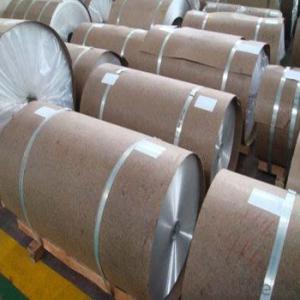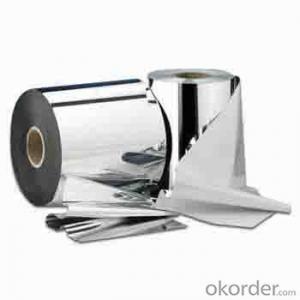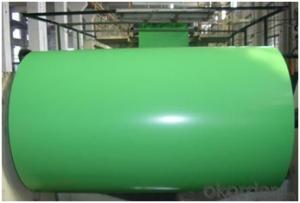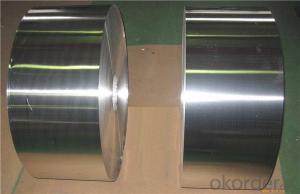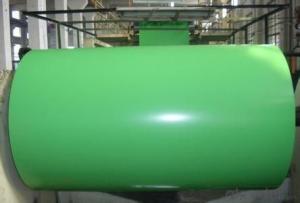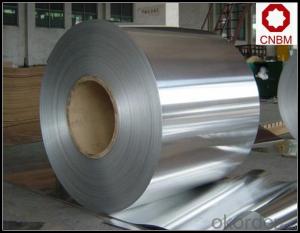Aluminum Direct Casting DC Coils and Rolls
- Loading Port:
- Shanghai
- Payment Terms:
- TT or LC
- Min Order Qty:
- 50 m.t.
- Supply Capability:
- 50000 m.t./month
OKorder Service Pledge
OKorder Financial Service
You Might Also Like
1.Specification
ALUMINIUM COIL
ALLOY: AA1***
AA3***
AA5***
TEMPER: H14 H16 H18 H22 H24 H26 H32 O/F
THICKNESS:0.03MM-3.0MM
WIDTH: 30MM-1700MM
COATING: PE(POLYESTER),PVDF,EPOXY
STANDARD: GB/T 17748-1999
2.Description
In Europe aluminium experiences high rates of recycling, ranging from 42% of beverage cans, 85% of
construction materials and 95% of transport vehicles.Recycled aluminium is known as secondary aluminium, but maintains the same physical properties as primary aluminium. Secondary aluminium is produced in a wide range of formats and is employed in 80% of alloy injections. Another important use is for extrusion.
White dross from primary aluminium production and from secondary recycling operations still contains useful quantities of aluminium that can be extracted industrially.The process produces aluminium billets, together with a highly complex waste material. This waste is difficult to manage. It reacts with water, releasing a mixture of gases (including, among others, hydrogen, acetylene, and ammonia), which spontaneously ignites on contact with air;contact with damp air results in the release of copious quantities of ammonia
gas. Despite these difficulties, the waste has found use as a filler in asphalt and concrete.
3.Why you can choose us?
We can promise the best quality and price!
4.Pictures
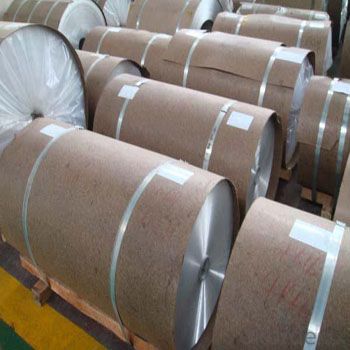
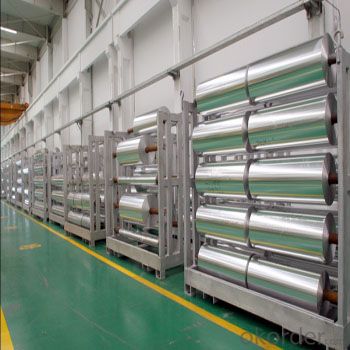
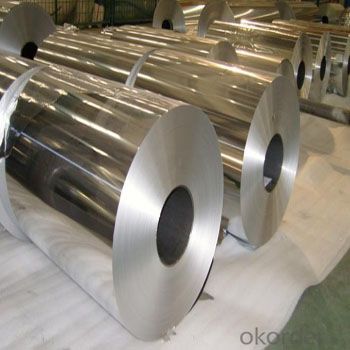
5.FAQ:
1)what is aluminum?
Aluminium (or aluminum; see spelling differences) is a chemical element in the boron group with symbol Al and atomic number 13. It is a silvery white, soft, nonmagnetic, ductile metal. Aluminium is the third most abundant element (after oxygen and silicon), and the most abundant metal in the Earth's crust. It makes up about 8% by weight of the Earth's solid surface.
Aluminium metal is so chemically reactive that native specimens are rare and limited to extreme reducing environments. Instead, it is found combined in over 270 different minerals.The chief ore of aluminium is bauxite.
2)What's kind of payment term we can supply?
CIF,CFR, FOB and other.
3)Can we supply samples?
Yes, we can!
- Q:What’s the difference between natural cooling and slice cooling?
- Cooling with furnace means after thermal insulation, stop heating furnace and make the parts in the furnace cool slowly to the room temperature with the furnace. Natural cooling is a kind of cooling method utilizing fluid circulation based on the fact that density varies with temperature to remove hea
- Q:What are the potential applications of stucco-embossed aluminum coils?
- Stucco-embossed aluminum coils have a wide range of potential applications due to their unique properties and aesthetic appeal. Here are some potential applications of stucco-embossed aluminum coils: 1. Building and construction: Stucco-embossed aluminum coils are commonly used in the construction industry for cladding and roofing purposes. The textured surface of the stucco pattern enhances the durability and strength of the aluminum, making it suitable for exterior applications. It can be used on commercial and residential buildings to provide a visually appealing and long-lasting finish. 2. Insulation: Stucco-embossed aluminum coils can also be used for insulation purposes. The textured surface helps to increase the surface area, which improves the thermal conductivity of the material. This makes it an ideal choice for applications where heat transfer needs to be controlled, such as in HVAC systems or refrigeration units. 3. Appliances: Stucco-embossed aluminum coils are commonly used in the manufacturing of various appliances. The textured surface not only adds visual interest but also provides a durable and easy-to-clean finish. It can be used for the production of kitchen appliances like refrigerators, dishwashers, and ovens, as well as for other household appliances such as air conditioners or water heaters. 4. Transportation: Stucco-embossed aluminum coils find applications in the transportation industry as well. The textured surface provides improved traction, making it suitable for flooring and decking in vehicles like buses, trains, and ships. It is also used for decorative purposes in the interior and exterior parts of automobiles, giving them a stylish and modern look. 5. Packaging: Stucco-embossed aluminum coils can be utilized in the packaging industry as well. The textured surface adds strength and rigidity to the material, making it ideal for manufacturing containers, trays, and packaging materials that require durability and protection. It can be used for food and beverage packaging, pharmaceutical packaging, and various other applications where a strong and visually appealing packaging solution is needed. Overall, the potential applications of stucco-embossed aluminum coils are diverse and versatile. From construction to insulation, appliances to transportation, and packaging to various other industries, the unique properties and aesthetic appeal of stucco-embossed aluminum make it a popular choice for a wide range of applications.
- Q:How do aluminum coils contribute to the fire resistance of products?
- Aluminum coils contribute to the fire resistance of products in several ways. Firstly, aluminum has a high melting point, which means that it can withstand high temperatures before it starts to deform or melt. This property is crucial in preventing the spread of fire as it helps to maintain the structural integrity of the product, limiting the fire's ability to penetrate or weaken it. Additionally, aluminum has excellent thermal conductivity, meaning it can efficiently dissipate heat. This characteristic plays a crucial role in fire resistance as it helps to cool down the surrounding area, minimizing the risk of ignition or combustion of nearby materials. By quickly transferring heat away from the source, aluminum coils can prevent the fire from spreading or escalating. Moreover, aluminum is non-combustible, which means it does not burn or support combustion. This property is vital in fire resistance as it prevents the aluminum coils from adding fuel to the fire. Instead, aluminum acts as a barrier, preventing the flames from reaching other flammable materials and reducing the overall fire hazard. Furthermore, aluminum is resistant to corrosion, which enables the coils to maintain their structural integrity over time, even in high humidity or corrosive environments. This durability is crucial as it ensures that the fire resistance properties of products remain intact, providing long-lasting protection against fire hazards. Overall, aluminum coils contribute to the fire resistance of products through their high melting point, excellent thermal conductivity, non-combustible nature, and resistance to corrosion. These properties work together to limit the spread of fire, dissipate heat efficiently, prevent the addition of fuel to the fire, and maintain the structural integrity of the product, ultimately enhancing its fire resistance capabilities.
- Q:Are aluminum coils suitable for high-strength applications?
- Aluminum coils are generally not suitable for high-strength applications due to their relatively low tensile strength compared to other materials such as steel. Aluminum has a lower strength-to-weight ratio and is more prone to deformation under high loads. However, there are specific alloys of aluminum that have been developed to enhance their strength, such as the 7000 series aluminum alloys, which can offer higher strength levels. These alloys are commonly used in aerospace and automotive industries for their lightweight properties and moderate strength. Nevertheless, for applications requiring the utmost strength, steel or other high-strength materials are usually preferred over aluminum coils.
- Q:How are aluminum coils tested for surface adhesion?
- To ensure the quality and performance of aluminum coils, various methods are employed to test their surface adhesion. Among these methods is the tape test, where a piece of adhesive tape is firmly applied to the coil's surface and swiftly removed. The amount of coating or paint that comes off with the tape is then evaluated to gauge the adhesion. If excessive coating is removed, it indicates poor surface adhesion. Another approach involves the use of a cross-cut or knife test, whereby a grid pattern is carved into the coil's surface using a sharp blade. The grid is subsequently covered with adhesive tape and swiftly removed. The adhesion is assessed by examining the extent to which the coating or paint is removed from the cut lines. If there is minimal or no removal of the coating, it suggests good surface adhesion. Moreover, the pull-off adhesion test is frequently conducted using specialized equipment. This test entails affixing a device to the coil's surface and applying gradually increasing force until the coating or paint begins to detach. The force required to cause detachment is measured, providing a quantitative measure of the surface adhesion strength. In summary, these testing methods play a crucial role in enabling manufacturers to evaluate the surface adhesion of aluminum coils and ensure compliance with the necessary standards in various industries, such as automotive, aerospace, and construction.
- Q:To put aluminum heads on my car do i have to add other things or basically can i just get them and put them on
- just put them on
- Q:Can aluminum coils be used in signage applications?
- Yes, aluminum coils can be used in signage applications. Aluminum is a popular material for signage due to its durability, corrosion resistance, and lightweight nature. It can be easily formed into various shapes and sizes, making it suitable for different types of signage such as outdoor signs, billboards, trade show displays, and more. Additionally, aluminum coils offer excellent weather resistance, ensuring that the signage remains intact and vibrant even in harsh environmental conditions. The versatility and longevity of aluminum make it a preferred choice for signage applications in various industries.
- Q:What is the typical coil diameter for aluminum coils?
- The typical coil diameter for aluminum coils can vary depending on the specific application and industry requirements. However, in general, aluminum coils typically have a diameter ranging from 12 inches to 72 inches. The specific diameter is determined by various factors such as the thickness of the aluminum sheet, the desired coil weight, and the equipment used for processing and handling the coils. Different industries, such as automotive, construction, and packaging, may have specific coil diameter specifications based on their unique manufacturing processes and end-use requirements.
- Q:I want to remove melted aluminium piston material from an engine cylinder with burning a hole in the cylinder!
- I am quite sure any acid strong enough to dissolve aluminium would be able to dissolve iron and steel, as acid + metal equations can be substituted with any metal and any acid.
- Q:Two days ago, my cocker spaniel ate most of a small aluminum bread pan--the disposable kind you can buy in the supermarket. The pieces I picked up when I discovered what he'd done were sharp, so I called the vet (right before closing), who recommended just keeping an eye on him for nausea, diarrhea, etc. The next morning I brought the dog and he showed no discomfort, but the vet put him on an antibiotic (esp. for gastric problems) just in case. It's been 48 hours, and the dog's still happy and eating and drinking, and when we go for a walk, his poo is fine (yep; I examine it!) ... if he's passed the aluminum, it must have been in the back yard when he was out on his own, and not on a walk. However, I'm still very anxious. At what point can I draw a sigh of relief? Thank you!
- my dog ( a 90 lb weimeraner ) has eaten alot of foil....I think he likes it ....dont worry. Of course consult your vet if you think anything is wrong. If he's eating ( and esp. drinking ) I'd say he's ok. They are amazing animals.
1. Manufacturer Overview |
|
|---|---|
| Location | |
| Year Established | |
| Annual Output Value | |
| Main Markets | |
| Company Certifications | |
2. Manufacturer Certificates |
|
|---|---|
| a) Certification Name | |
| Range | |
| Reference | |
| Validity Period | |
3. Manufacturer Capability |
|
|---|---|
| a)Trade Capacity | |
| Nearest Port | |
| Export Percentage | |
| No.of Employees in Trade Department | |
| Language Spoken: | |
| b)Factory Information | |
| Factory Size: | |
| No. of Production Lines | |
| Contract Manufacturing | |
| Product Price Range | |
Send your message to us
Aluminum Direct Casting DC Coils and Rolls
- Loading Port:
- Shanghai
- Payment Terms:
- TT or LC
- Min Order Qty:
- 50 m.t.
- Supply Capability:
- 50000 m.t./month
OKorder Service Pledge
OKorder Financial Service
Similar products
New products
Hot products
Hot Searches
Related keywords
